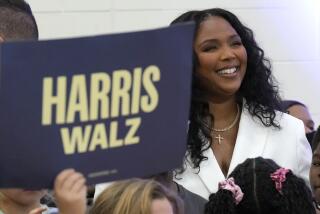Black voters feeling left out in Michigan
DETROIT — The absence of Sen. Barack Obama’s name from today’s Michigan Democratic primary ballot has angered a large swath of African American voters here, exacerbating a racial political divide and threatening party unity heading into the November general election.
Many black voters are already unhappy about the state’s new voter identification law and a 2006 voter-approved referendum barring affirmative action in public hiring.
Their frustrations have heightened by not being able to vote -- about a week before the Rev. Martin Luther King Jr.’s birthday -- for the first African American candidate in serious contention for a major party presidential nomination.
At issue is a decision by Obama and former Sen. John Edwards of North Carolina to withdraw their names from the Michigan ballot in October. That came after the national Democratic Party imposed sanctions on the state party for scheduling its primary ahead of the date the national party had approved -- Feb. 5, or Super Tuesday.
At the time, the withdrawals were seen as a ploy to isolate Sen. Hillary Rodham Clinton of New York, who had a large lead in national polls, and to make it seem as though she were taking advantage of the standoff.
But the perception among rank-and-file Democrats is that the state party leadership lost a showdown with the Democratic National Committee.
The national party stripped Michigan of its 156 convention delegates, disenfranchising a large part of its political base in the process. And it threatens to weaken the party in a key state for the general election.
“Could I say it brings us closer together? I can’t,” said Rep. John Conyers Jr., who has represented much of Detroit for more than 40 years.
The state party has urged supporters to vote anyway, casting ballots for “uncommitted” if their candidates’ names don’t appear. The uncommitted delegates would be allotted to candidates during meetings March 29 in the state’s 15 congressional districts, in hopes that the delegates ultimately will be seated, said Mark Brewer, chairman of the state Democratic Party.
But some African American leaders are also pushing an “uncommitted” vote as a sign of protest.
“What started out as an effort to say we don’t want to vote for Hillary, we want to vote for somebody else, now has turned into a protest that we don’t get a chance to express who we want to vote for,” said Edna Bell, a former Wayne County commissioner and Obama supporter, who is one of the leaders of the effort. “Those folks right now are feeling disenfranchised.”
The frustration runs deep and is a further indication of the chasm of distrust between many black voters and the state party leadership.
“It smacks of pre-1963,” said the Rev. Oscar King III, pastor of Detroit’s Northwest Unity Missionary Baptist Church. King said he and others were suspicious of the party leadership.
“This is a system we look at with a jaundiced eye,” King said. “Too often they tell us what they want when they need us, and there’s never any quid pro quo. The constituency is relatively tired of being ignored by one party and taken advantage of by another.”
Brewer, the state chairman, said he expected Michigan’s delegates would ultimately find seats at the convention.
“That part of the penalty in the past, when it’s been applied, has always been lifted,” Brewer said, adding that Michigan is crucial to success in the general election.
“Michigan politically is so important to the candidate, he can’t become the Democratic president of this country without carrying Michigan,” Brewer said. “So a way will be found to seat us.”
But Brewer acknowledged the state party had some bridges to rebuild.
“I just have to explain it to folks,” Brewer said. Obama “took himself off, but he’s also now telling his supporters, ‘Here, this is the way that you can go vote for me’ ” by casting uncommitted ballots.
Deborah Thomas, a Wayne County Circuit Court judge, said much of the dissension had grown from voters not understanding the process.
“It’s not like a general election where you would expect every declared candidate to be there,” she said. “That kind of confuses people, and they’re blaming everybody.”
--
--
Democratic debate
The Democratic presidential candidates will debate today at the Cashman Center in Las Vegas. The two-hour forum will be broadcast at 6 p.m. Pacific time on MSNBC.
More to Read
Get the L.A. Times Politics newsletter
Deeply reported insights into legislation, politics and policy from Sacramento, Washington and beyond. In your inbox three times per week.
You may occasionally receive promotional content from the Los Angeles Times.











